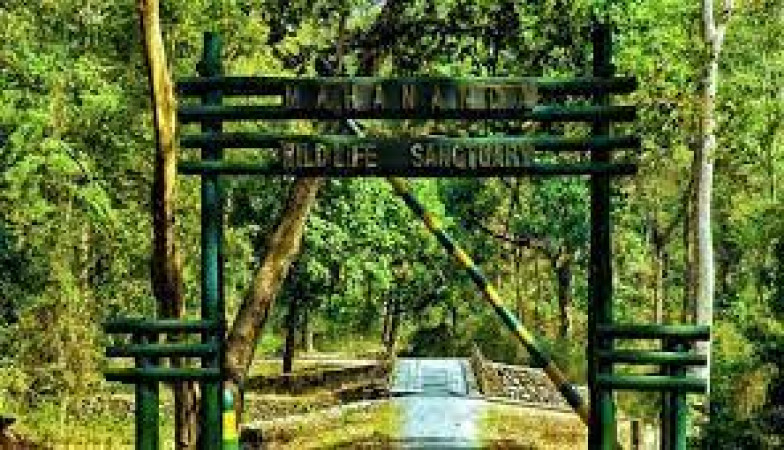
Mahanada Wildlife Sanctuary
Dooars . West Bengal . India
Duration
2 to 4 Days
2 to 4 Days
Best time to visit
Oct-Feb
Oct-Feb
Theme
Wildlife
Wildlife
Mahananda Wildlife Sanctuary Travel Guide
Mahananda Wildlife Sanctuary, located in the foothills of the Himalayas in India, is a haven for nature lovers and wildlife enthusiasts. Established in 1955, this sanctuary is spread over 159 square kilometers and is home to a diverse range of flora and fauna. Visitors can explore lush green forests, gushing rivers, and a variety of wildlife, including elephants, tigers, leopards, and over 300 species of birds. The sanctuary's picturesque landscape and rich biodiversity make it a popular destination for ecotourism and wildlife photography.Top Attractions in Mahananda Wildlife Sanctuary
- Wildlife Safari
- Jungle Trekking
- Bird Watching
- River Rafting in Teesta River
- Visit to Mahananda River Barrage
Mahananda Wildlife Sanctuary is Famous for
Its rich biodiversity and stunning natural beauty.Top Attractions in Mahananda Wildlife Sanctuary
- Exploring the dense forests
- Spotting rare wildlife species
- Enjoying the tranquility of nature
- Interacting with local tribes
- Participating in eco-friendly activities
What's Great about Travelling to Mahananda Wildlife Sanctuary?
- Perfect for nature and wildlife enthusiasts
- Offers a peaceful retreat from city life
- Great for adventure seekers
What's Not So Great about Travelling to Mahananda Wildlife Sanctuary?
- Limited accommodation options
- Remote location might not be suitable for all travelers
- Weather can be unpredictable
Travel Tips for Mahananda Wildlife Sanctuary
- Obtain necessary permits before entering the sanctuary
- Wear comfortable clothing and sturdy shoes for trekking
- Carry insect repellent and sun protection
Important Mahananda Wildlife Sanctuary trip information
- Ideal Duration: 2-3 days
- Best Time to Visit: October to May
- Nearby Airports and Railway Stations: Bagdogra Airport and New Jalpaiguri Railway Station
FAQ's on Mahanada Wildlife Sanctuary
Q1: What is the best time to visit Mahanada Wildlife Sanctuary?
The best time to visit Mahanada Wildlife Sanctuary is during the winter months from October to March when the weather is cool and pleasant, and the wildlife is more active. This period also coincides with the migratory bird season, offering excellent birdwatching opportunities. It is advisable to avoid the monsoon season from June to September due to heavy rainfall, which can make the sanctuary inaccessible.
Q2: Do I need a visa to travel to Mahanada Wildlife Sanctuary?
As Mahanada Wildlife Sanctuary is located in India, most tourists will need a visa to travel there. Visitors should check with the nearest Indian embassy or consulate for specific visa requirements based on their nationality. Some countries may be eligible for an e-visa or visa on arrival, but it is essential to verify the latest regulations before traveling.
Q3: What are the must-visit attractions in Mahanada Wildlife Sanctuary?
The must-visit attractions in Mahanada Wildlife Sanctuary include the diverse range of flora and fauna, such as elephants, tigers, leopards, rhinoceros, and various bird species. The sanctuary offers exciting jungle safaris, nature walks, and birdwatching opportunities for wildlife enthusiasts. Visitors can explore the lush forests, grasslands, and rivers while enjoying the serenity of nature in this pristine environment.
Q4: Is Mahanada Wildlife Sanctuary a safe place to travel?
Mahanada Wildlife Sanctuary is generally safe for travelers, but it is essential to follow guidelines provided by park authorities and exercise caution while exploring the wilderness. It is advisable to stay on designated paths during safaris, avoid approaching wild animals closely, and adhere to park rules for a safe and enjoyable experience.
Q5: What is the local currency in Mahanada Wildlife Sanctuary and can I use credit cards?
The local currency in Mahanada Wildlife Sanctuary is the Indian Rupee (INR). While major cities may accept credit cards, it is recommended to carry sufficient cash for transactions within the sanctuary. ATMs may not be readily available, so it is advisable to plan ahead for cash needs during the visit.
Q6: What is the local cuisine like in Mahanada Wildlife Sanctuary?
The local cuisine in Mahanada Wildlife Sanctuary offers a mix of traditional Indian flavors with a focus on fresh ingredients. Visitors can savor authentic dishes like rice, dal (lentils), vegetables, and local delicacies prepared with aromatic spices. Food options may vary based on the accommodation facilities within the sanctuary, but travelers can expect a taste of regional cuisine that reflects the cultural richness of the area.
Q7: What transportation options are available in Mahanada Wildlife Sanctuary?
Transportation options in Mahanada Wildlife Sanctuary include private vehicles, guided safaris, and organized tours provided by the park authorities or local operators. Visitors can also access the sanctuary by public transport to nearby towns and then arrange for a transfer to the entrance. It is advisable to book transportation in advance to ensure a smooth journey to and within the sanctuary.
Q8: Are there any cultural norms or etiquette I should be aware of when visiting Mahanada Wildlife Sanctuary?
When visiting Mahanada Wildlife Sanctuary, it is essential to respect the local customs and wildlife conservation efforts. Visitors should maintain a respectful distance from animals, refrain from littering, and follow the instructions of park guides during safaris. Additionally, dressing modestly and being mindful of noise levels in the sanctuary are important to preserve the natural habitat and ensure a harmonious experience for all visitors.
Q9: I am a travel agent. How can I buy travel leads of Mahanada Wildlife Sanctuary?
Register yourself as a travel agent at agents.tripclap.com and then you can buy travel leads to Mahanada Wildlife Sanctuary once your account is approved. For more details contact our support team at +91-8069186564 or support@tripclap.com
